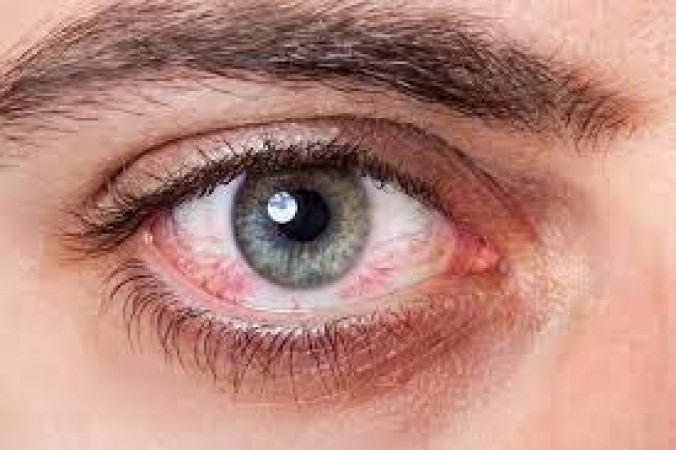
Winter's arrival brings with it a picturesque landscape of snow-covered landscapes and cozy evenings by the fireplace. However, for some individuals, this season also introduces the discomfort of red and irritated eyes. If you find yourself grappling with this issue, worry not! We have sought advice from experts to provide you with immediate relief and ensure you can enjoy the winter season with clear and comfortable vision.
One of the primary contributors to winter-related eye discomfort is the prevalence of dry indoor air. The constant operation of heating systems during this season significantly reduces the humidity indoors, leading to dry and irritated eyes.
In heated environments, the moisture content in the air decreases, causing an imbalance in the tear film that protects the eyes. This imbalance results in symptoms such as redness, itching, and a gritty sensation.
The brisk winter winds that characterize this season can strip away the natural moisture from your eyes. As a result, your eyes become more susceptible to irritation, redness, and a burning sensation.
The cold air, coupled with low humidity levels, contributes to the rapid evaporation of tears, leaving the eyes without an adequate protective layer. Understanding these environmental factors is crucial in addressing and preventing winter-related eye issues.
Staying adequately hydrated is a fundamental step in addressing winter-induced dry eyes. Drinking plenty of water helps maintain overall bodily hydration, including the moisture levels in your eyes.
When the body is well-hydrated, it ensures that your tear ducts are producing an adequate amount of tears, preventing the discomfort associated with dry eyes. Make a conscious effort to increase your water intake, especially in heated indoor environments.
Blinking may seem like a simple and automatic action, but it plays a crucial role in maintaining the health of your eyes. Frequent blinking helps distribute natural tears across the surface of the eyes, providing essential lubrication.
For individuals spending extended periods in front of screens, whether for work or leisure, the tendency to blink less increases. This can contribute to dry eyes. Therefore, make a conscious effort to blink regularly, particularly when engaged in screen-based activities.
Artificial tears or lubricating eye drops are a quick and effective solution for immediate relief from red and dry eyes. These drops provide the necessary moisture to the eyes, alleviating discomfort and restoring a more comfortable feeling.
Keep a small bottle of lubricating eye drops with you, especially if you spend significant time in heated indoor spaces. Applying artificial tears at regular intervals can prevent your eyes from drying out.
A warm compress is a simple yet effective home remedy for relieving eye strain and discomfort. The warmth helps improve blood circulation around the eyes, reducing irritation and promoting relaxation.
To use a warm compress, soak a clean cloth in warm water, wring out excess water, and place it over closed eyes for several minutes. This can be done multiple times a day to soothe tired and irritated eyes.
Investing in a humidifier is a proactive measure to combat the dryness caused by indoor heating systems. A humidifier adds moisture to the air, preventing it from becoming excessively dry and contributing to eye discomfort.
Place a humidifier in commonly used areas, such as bedrooms or living rooms, to ensure that the air retains sufficient moisture. This helps in maintaining a more comfortable environment for your eyes.
When venturing outdoors, especially on windy winter days, wearing protective eyewear, such as sunglasses, is crucial. Sunglasses act as a barrier, shielding your eyes from the cold wind and reducing the risk of irritation.
Look for sunglasses that offer protection against both UVA and UVB rays to safeguard your eyes from harmful sunlight. Additionally, choose sunglasses with wrap-around frames for maximum coverage.
Extended screen time is a common contributor to eye strain and dryness. To alleviate this, it's essential to take regular breaks to rest your eyes and reduce strain. The 20-20-20 rule is a helpful guideline: every 20 minutes, take a 20-second break, and look at something 20 feet away. This practice helps prevent digital eye strain and promotes overall eye health.
Diet plays a crucial role in maintaining eye health. Include foods rich in omega-3 fatty acids, such as fish, flaxseeds, and walnuts, as these contribute to the lubrication of the eyes.
Vitamins A and D are also essential for eye health. Foods like carrots, sweet potatoes, spinach, and citrus fruits provide these vitamins, promoting overall eye well-being. Ensure a balanced and nutrient-rich diet to support your eye health during the winter months.
While it may be a natural instinct, rubbing your eyes can worsen irritation and redness. The hands carry dirt and bacteria, and rubbing can potentially damage the delicate tissues of the eyes. Instead of rubbing your eyes, use a clean tissue to gently blot away any excess moisture. If irritation persists, consider using lubricating eye drops for relief without causing additional harm.
If the problem persists or becomes more severe, seeking the guidance of an eye care professional is crucial. Optometrists and ophthalmologists are trained to diagnose and treat various eye conditions, providing personalized advice based on your specific situation.
A comprehensive eye examination can reveal underlying issues contributing to red eyes, and the professional can recommend appropriate treatments or interventions. Do not hesitate to schedule an appointment if your symptoms persist or worsen.
With these expert tips, you can bid farewell to red eyes and embrace the winter season with clear and comfortable vision. Remember, a proactive approach to eye care can make a significant difference in your overall well-being. By incorporating these simple yet effective strategies into your daily routine, you can enjoy the beauty of winter without the discomfort of red and irritated eyes.
Top 10 Most Powerful Countries in the World: 2023 Rankings Based on GDP and Population
World Hypnotism Day Celebrates the Power and Truth of Hypnosis
National Spaghetti Day 2024: Celebrating the Beloved Pasta Dish